When an editor from Storey Publishing persuaded Stephen Philbrick ’71 and his son Frank ’01 to write a book called The Backyard Lumberjack, the Philbricks had no idea how many times they’d be subjected to the chorus of Monty Python’s “Lumberjack Song.”
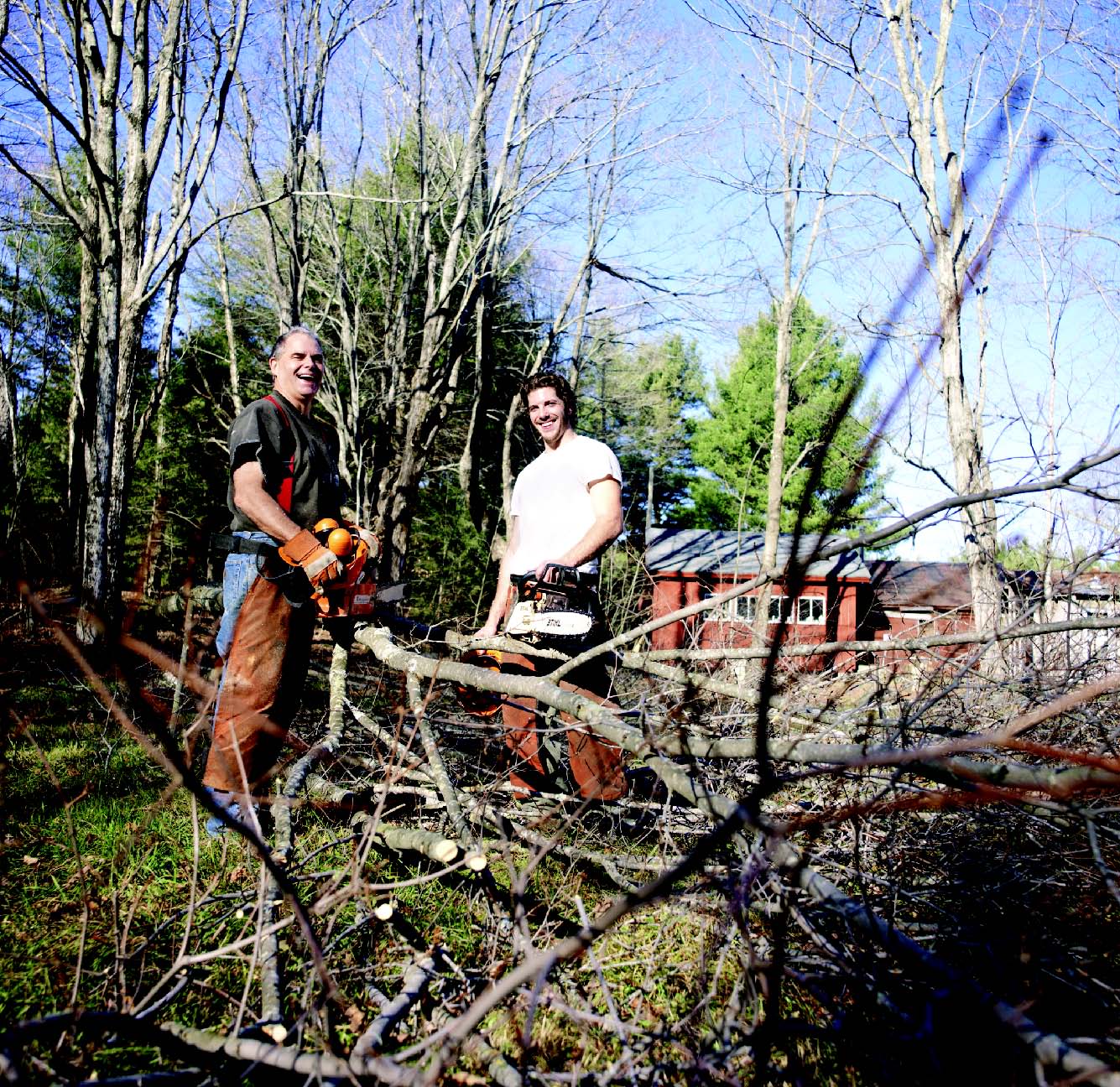
“Everyone sings it to us,” sighs Stephen.
Frank tries to recite a few lines but gets only as far as the first verse. “Isn’t there something about wearing women’s underwear?” he asks.
“Yeah,” jokes Stephen. “It’s like they’ve known us all their lives.”
The Philbricks are sprawled in the snug, low-ceilinged kitchen of Stephen’s 1806 home in Windsor, Massachusetts. The room is heated by a wood-burning stove. It looks like a woodsman’s kitchen but for the professional Viking range—a donation through the Philbricks’ church—and handsome soapstone panels set into the stove’s cast-iron frame.
“I got a raise from the church,” explains Stephen, who, in addition to being a lumberjack, is a Congregationalist minister in the neighboring town of West Cummington and a poet. “Soapstone is one of the few material things I’ve ever coveted.”
Like his father and grandfather before him, Frank Philbrick concentrated in poetry at Brown. He’s also a former carpenter, a sometime contestant in logging games, and a full-time writer; for two years he was a minor league baseball pitcher. In the Monty Python song, the singer chops down trees and wears “high heels, suspenders and a bra, just like my dear papa.” Frank fells trees but forgoes the women’s wear; his father draws the line at bright red suspenders. Together, they possess every millisecond of the Python team’s fabled quick wit, scooping up each other’s punch lines and telling stories on themselves and each other.

There’s the one about pulling a dead cow out of a swimming pool belonging to neighbor and former U. S. poet laureate Richard Wilbur (Stephen: “I’d do it for someone who writes that well; now if he were a science fiction writer …”); about chopping down a tree, finding frozen ants inside, and downing them like raisins (Frank: “I’d heard they tasted like salad dressing”); or about roasting a pig’s private parts as a practical joke (a story they were dismayed to find edited out of their book).
Initially, The Backyard Lumberjack was conceived as a how-to manual instructing first-time woodcutters on how to fell and buck trees and how to split, stack, and burn wood. The book was the brainchild of Deborah Balmuth, a Windsor neighbor and Storey editor, who hadn’t found the right author for her idea until she attended the Philbricks’ annual New Year’s Eve bonfire bash on their 120-acre property.
“They throw a great party,” she recalls, “but it’s more primal than wild. You’re in the woods in the heart of winter; there’s snow on the ground and it’s deeply cold and dark. Then these fire fanatics light this huge, intense bonfire, and suddenly, there’s warmth and light. It’s a gorgeous sight.”
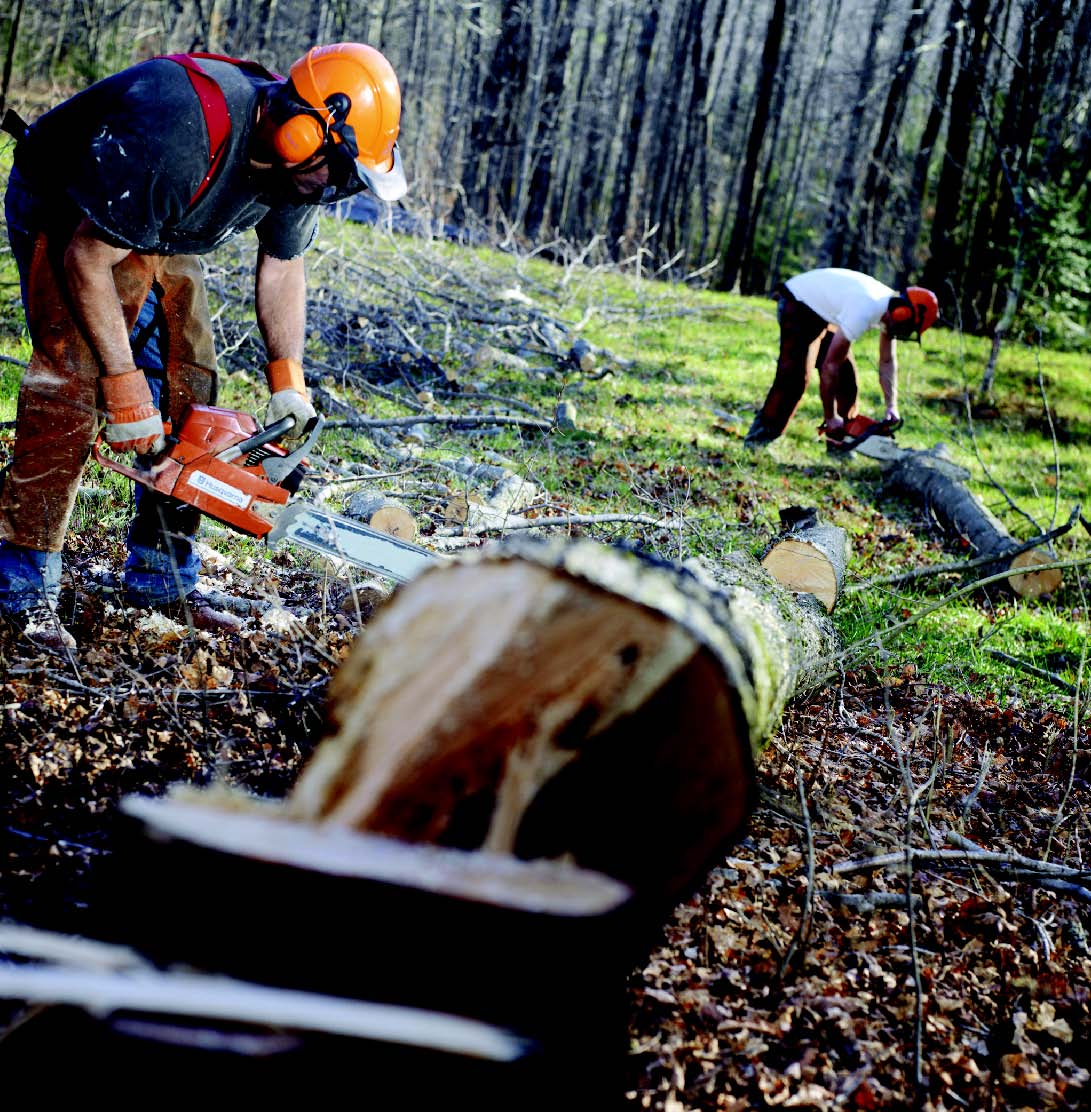
Balmuth had thought of asking Stephen to do the lumberjack book—“I knew he liked to cut things down”—but she couldn’t imagine a poet writing about anything as prosaic as firewood. Then Stephen mentioned that Frank aspired to become a writer, and Balmuth approached Frank about the book idea. He agreed to write it, she says, “on one condition: that he do it with his dad.”
The fruit of Balmuth’s brainstorm is an immensely practical guide with the heart of a father-son canto. It reveals how to chop down trees for firewood, but it’s even more revealing of its authors’ tender, joking, evolving, loving relationship. In alternating voices, père et fils tease and cajole each other on paper, just as they do in person. Here’s Frank introducing his father’s chapter on felling trees, called “Timber!”
Dad has brought down many more trees than I have at this point, and he has learned the little techniques and subtleties necessary to do this dangerous task efficiently and safely. He will ramble, though, so if it gets too dry skip to the part where he gets eaten alive by hornets.
What makes The Backyard Lumberjack so rare, however, isn’t its humor, or its instructions on making felling notches and bucking wood (cutting branches and trunk down to stove-length pieces); it’s the palpable joy and gratitude of the authors, a father and son who now live 200 miles apart—Frank shares an apartment with friends in Brooklyn, New York—reveling in the opportunity to come together on paper.
“So much of our relationship has been about working together,” says Stephen. “Since Frank was a year and a half old we’ve been working in the woods and at the woodpile, in the hay meadow and the lambing barn, and on the baseball field.”
“In everything,” interjects Frank, absently tossing and catching a lemon as if it were a baseball, “except writing."
So imagine how we felt about this project where we could work together on a book about working together. It’s been the sweetest, most satisfying, unexpected thing …” Stephen’s voice breaks and he stops abruptly—lumberjacks, even if they happen to be poets, don’t cry.
The Philbricks’ poetic vocation lies at the very heart of their relationship. Stephen’s father, Charles Philbrick ’47, ’53 PhD, was a poet who taught English at Brown and won the Wallace Stevens Prize from the Academy of American Poets. Stephen sums up the rarity of having three generations of poets in one family as “… having to do with understanding and being understood by your father.”
Stephen explains that his own grandfather Arthur Lloyd Philbrick, who pitched baseball for Hope High School in Providence and graduated from Brown in 1904, never achieved his goal of becoming a professor. Instead he gave his son Charles what Stephen calls the greatest gift, “something that you yourself never received,” by encouraging him to study English. Still, Arthur was a tough critic of Charles’s work. “My dad felt misunderstood,” recollects Stephen. A generation later, Stephen showed his father his own poetry, and while Charles didn’t offer much formal help, Stephen says, “he gave me the affirmation he never received.” Affirmation that Stephen, in turn, has passed on to Frank.
“Poetry for us has never been about rebellion,” Stephen says. “It’s the most natural thing in the world—an involuntary activity, like a heartbeat. I read to Frank and [his brother] Charlie every night from the time they were born. Their father’s voice reading—my father’s voice reciting poetry—is what the human voice sounds like to us.”
Charles Philbrick died at age forty-eight in 1971, the same year Stephen graduated from Brown. “He was a wonderful teacher,” says Stephen, “but I never got to be friends with him, or colleagues with him. What a joy it is to have that experience now with Frank.”
Although their book is an example of how elegantly father and son straddle the gulf between their two vocations (the oxymoron “poet lumberjack” amuses them and they’ll remind you that Thoreau wrote Walden in the woods), the Philbricks look more like woodsmen than men of letters. Or maybe they just look like what they are: athletes. (When Stephen leaves the room after a discussion of Frank’s days in the minors, Frank sets the record straight by noting that his dad was the stronger ballplayer. “He was scouted by the Red Sox,” he reveals, still impressed by a story he must have heard over and over as a kid.)
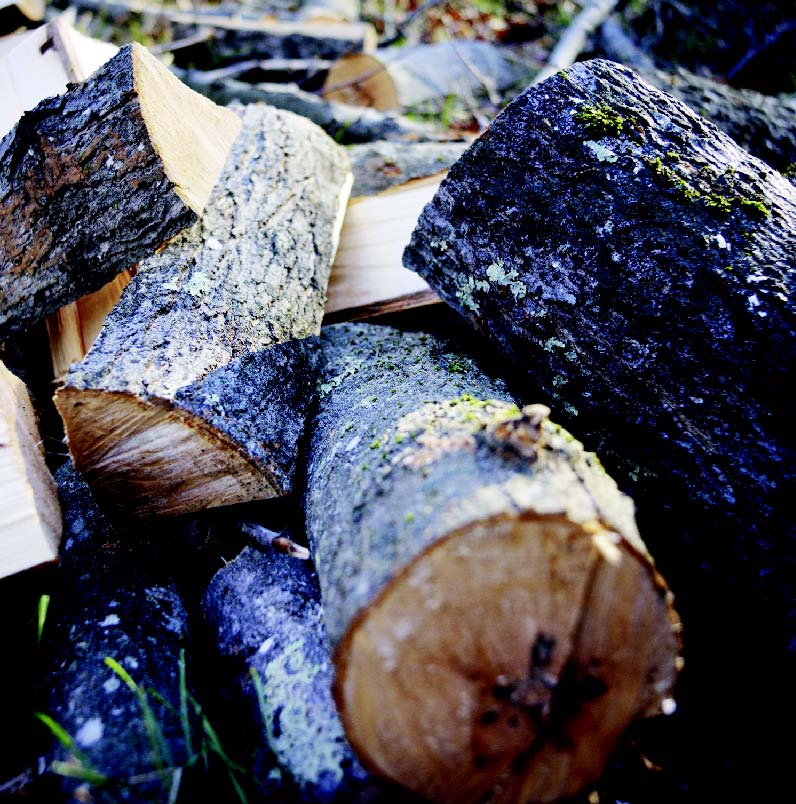
The Philbricks’ physicality is impossible to ignore. Tall and muscular, both men tend more toward motion than repose (“I’m trying to learn to slow down,” claims Stephen; Frank rolls his eyes). In fact, by signing them as writers, Storey also garnered itself two models, as the Philbricks posed for all the illustrations in The Backyard Lumberjack. Their prominent chins, curly hair, and good looks don’t hurt the book’s success any more than their very readable prose (Frank, in both features and body, is essentially Stephen, attenuated).
These are men who list beer as one of the main things they have in common. You’d trust them to tell you how to manage your woodlot for the sake of the trees, the wildlife, and your fuel bill. They explain that apple, hickory, beech, and maple, for instance, release 20 million or more Btus per cord of wood; cherry and hemlock give off only 15–17 million. But the book conveys more than practical know-how. It had to for the Philbricks to take it on.
“Much as I love wood,” says Frank, “I didn’t want to spend the twenty-seventh year of my life writing about how to split the stuff.” He tells about delivering wood in New York City one winter. “Guys talked about firewood like it was red wine—‘the delicate aromas, good acrid smells, and mixtures of flavor.’ It was killing me.” He shakes his head in amused disbelief.
For the Philbricks, their book is as much about language as it is wood and trees. A felled tree a few feet from the ground is in a potentially dangerous “interrupted state of falling.” Instead of simply referring to a “cluster of trees,” the authors call attention to the eccentric collection of cognates that share its meaning: “spinney, copse, coppice, thicket, and glen,” and then offer the useful suggestion, “To entertain yourself when nothing interesting is being said around a crudités tray … try using them all in one sentence.”
Nor do they skimp on their love of the woods themselves: the beauty and solitude they offer and the quiet shelter they provide for humans and animals alike. In his preface Frank writes reverently of following a chipmunk’s tracks in the snow one evening:
Soon enough the spacing of the tracks shortened up and described an abrupt buttonhook. Not three steps back the way he’d come there were twin angel wings in the snow. Two long, serrated crescents enfolded the delicate tracks.
Frank realizes he has witnessed “the stunning, blissful forensics of a late-night murder, or meal.” An owl has literally snatched the chipmunk from its own footprints. He continues:
Everyone has had that same moment in which he or she glimpsed, but radically underestimated, impending tragedy. Gaining confirmation that this sickening moment has its roots threaded honestly in the natural world was reassuring to someone afraid of having all animal influence bleached out by civilization.
The Philbricks write with equal passion about the austerely beautiful, hardscrabble hill towns of western Massachusetts—tough, heavily forested, high places of igneous outcrops and fast-running rivers, where come spring people tap maples not for fun but for money. They write about hill-town people, too; woodsmen like Frannie Wells, “a Renaissance man, Jefferson’s ideal: the educated yeoman farmer,” a man who would sell thirteen ears of corn for the price of a dozen—“just in case.”
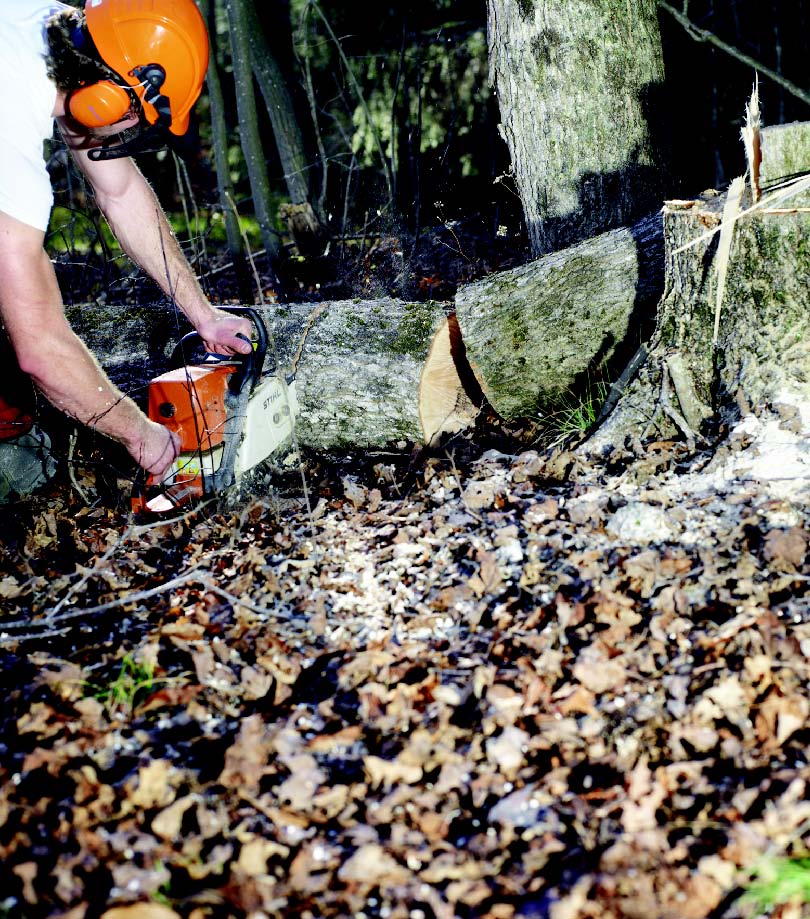
They also profile Lincoln Fish, a soft-spoken foresting consultant, who is quick to note that his connection with Stephen has nothing to do with wood. The wood part—Lincoln drafted a green-certified management plan for the Philbricks’ property—came later. “I met Stephen at church,” Fish explains, “but I really got to know him through baseball,” when Stephen coached Fish’s two sons. “Because of his physical skills and his remarkable verbal ability to explain things, my boys really benefited from Stephen’s coaching. They may not go on with baseball, but the things they learned from him apply to everything.” The fact that Fish, a forester, met the author of a book on lumberjacking through sports and the church speaks to the heart of hill-town life. Members of these small, self-sufficient communities are valued for their skills and talents more than their professional status, and wind up wearing many hats. Call it a kind of pre-industrial Yankee pragmatism in which the communal principle is who can do what, rather than who has the highest degree or social status.Whatever the name, it elicits the best in people and makes for tight-knit bonds.
Another hill-town woodsman is famous for his “arrow-straight” woodpile. Stephen’s own stack is neat in a relaxed sort of way, and prodigiously tall. It’s more than a source of pride to the Philbricks; it’s the product of their favorite pastime: wood splitting. Stephen and his second wife, Connie Talbot, have a working furnace at home, but they don’t use it. A well-known potter, she works in an adjacent studio that’s also heated by a woodstove. She laughs when asked if she helps to gather wood. “I used to,” she says. “I’d do some splitting and I still stack sometimes. But why should I do it when they’re crazy about it? And they are crazy. They love to split wood.”
“I like running a chain saw,” says Frank, lifting his eyebrows to suggest a myriad of dangerous scenarios, “but splitting is more primal, and safer, so you can let yourself go, and you can shoot the breeze. You can’t talk while you saw. With splitting, you can either whale away at it or really concentrate on each stroke down to a sixteenth of an inch.”
“I don’t play music,” says Stephen. “I wish I did. But I think that splitting for me is what playing music is for others. It’s an intensely private and personal thing that you can also share with like-spirited people. You can practice by yourself or play in a band.”
Ultimately, Frank says, splitting wood means talking, and communication is why father and son head into the forest. “I’ve never mentioned it in so many words,” he writes in the book, “but these working talks are sometimes Dad’s sermons to me, as I can’t often be pinned in church. Anything that needs to be said is labored out stroke on stroke, and the wells that fill in our absence are bucketed dry as the newly exposed wood piles up.”
To spend time with the Philbricks is to suspect that the transitive property in mathematics (if A=B, and B=C, then A=C) describes their lives. Spirituality is to the woods as the woods are to poetry, as, finally, poetry is to spirituality. The things that matter most to them not only bear equal values in their lives but are so interconnected that they become different aspects of a single experience. It’s a holistic approach to religion, nature, and writing that allows both father and son to ignore categories and break down stereotypes.
By the sheerest places on your mountain
The depth is above as well as below us;
The silence roars in waves;
I assume the mercy and the memory of shores
—even when there is no sea.
—from G.M.F by Stephen Philbrick
Stephen has been minister of the West Cummington Congregational Church for the past twelve years. It’s a simple, beautiful building—the clasped-hand church of the New England countryside—built of bead board in 1838. There is no cross (“a murder symbol for other religions,” remarks Stephen; he wears one on a leather necklace, a gift from a friend, only when he fells trees). Being inside the church is as close to being in nature as architecture comes. Its wooden austerity well suits a lumberjack minister—especially one who landed in the job by accident.
“There’s one way in which [being a minister] was inevitable,” Stephen reflects. “That’s true,” interrupts Frank. “The part of him that made a good baseball coach and a good father and a good farmer have all been brought to the fore.”
“But it’s also completely improbable,” continues his father. “My parents never went to church.”
When the church’s former minister left, members at first took turns leading services; Stephen says he wound up taking more turns than anyone else and eventually became accredited. A dozen years later, the congregation has grown to the point that it fills pews on an average Sunday. “My friends from Brown, who come to the New Year’s Eve bonfire every year—they were like, ‘What? Your dad, a minister?’ ” Frank laughs.
Joking aside, Frank’s friends put their fingers on the key to Stephen’s success. It’s precisely his lack of premeditated doctrine that makes him so successful in West Cummington. “I didn’t become a minister,” emphasizes Stephen. “I became the minister of this church,” whose congregation is at once intellectually pragmatic and demanding, shunning dogma of all kinds.
“All they ask,” says Stephen, “is the Word as I preach it.”
Deborah Balmouth, the Philbricks’ neighbor and editor at Storey Publishing, is also a member of the challenging congregation. “Our lives overlap in all kinds of ways,” she says, laughing. Deborah directly credits Stephen with making the church an exciting place to be on Sunday mornings. “He’s shared so much of himself—the same creative energy he puts into poetry—that it encourages all of us to bring forth what’s within. It really is like scripture come to life.”
The faces in Stephen’s congregation reflect what he calls the “two constituencies” of the hill towns: Yankee farmers and erudite, liberal newcomers, both perfectly at home in Cummington, which harbors two poets laureate (Richard Wilbur and William Jay Smith—“at that ratio,” Stephen figures, “Manhattan should have 16,000”). The combination makes for an understanding congregation, one that was proud to have given Stephen his first sabbatical last year so he could devote his time entirely to writing.
Stephen is the author of three books of poetry and is preparing a fourth. His father recorded the first poem he composed at age five, as the two stood beside the ocean: “Out in the middle is deep dark blue / But not as deep as I love you.”
Choosing not to follow his father’s example of working as a poet within the academy, after graduating from Brown Stephen did various odd jobs including cutting pulpwood in northern Georgia, where he learned, mostly through trial and error, the woodsman’s craft. “I’m lucky to be alive,” he remarks dryly; he also drove the region’s first racially integrated school bus, about which the same comment applies. When Frank was fifteen months old, Stephen and his first wife bought a sheep farm in Cummington and raised livestock until Stephen assumed the duties of a full-time minister.
Being a farmer meant that Stephen was on hand more than most fathers when Frank and his brother, Charlie, were young. In a sense he became a stay-at-home dad. “The boys were with me a lot,” he recalls. “I’d set them on my lap on the tractor and we’d ride around all morning or afternoon. It gave us a chance to have a physical connection that most mothers usually have with their kids, kind of an amniotic feeling—a trust in one another.”
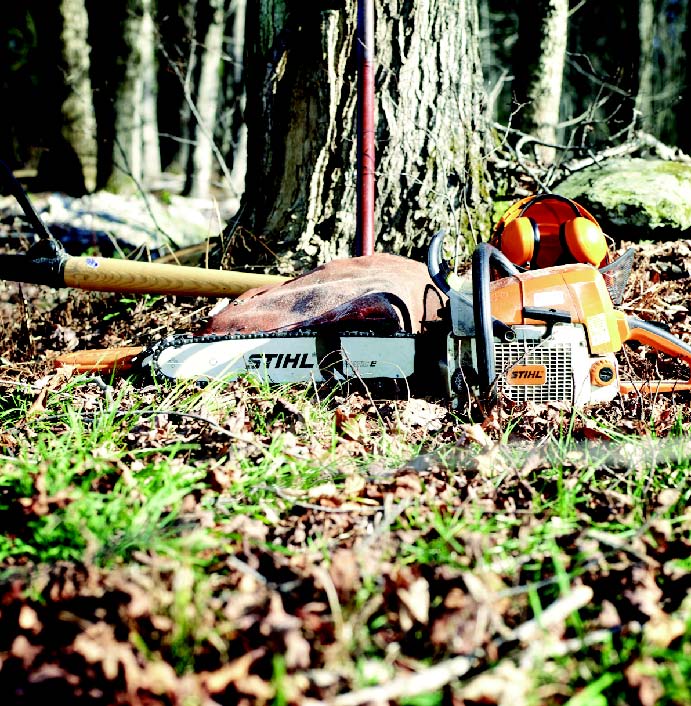
A neighbor of the Philbricks once commented on the expediency of Stephen’s relationship with his sons. He noted that when they were little and “helped” Stephen clean the barn it took twice as long, but that by the time they were nine or ten they were doing it themselves. “He wanted to know if it was a plan,” says Stephen, laughing. “That’s so funny. It just came out of wanting to be together.”
Charlie Philbrick, Frank’s younger brother, is equally close to his dad and equally at home in the woods. At a young age, though, he traded in baseball for skateboarding. He’s considering a future in environmental law. “He doesn’t take after me any less than Frank,” says Stephen of Charlie, “just as my three brothers aren’t poets, but they all feel they inherited something from my dad.” (Stephen’s brother Tim, for instance, is a boat-builder, practicing a craft he learned from their father.)
Frank, meanwhile, is following his father’s path on baseball diamonds and woodlots, working anywhere but behind a desk, “running hog wild” with friends in the city. The Backyard Lumberjack, however, may alter his trajectory. Since its publication, Stephen has been getting calls from friends asking him to take down trees, but Frank has heard from a talent agent who saw him chop wood on national television and wants to represent him as an actor. Frank doesn’t know where it may lead, but he plans to enjoy the ride; he’s also working on a book about his time in the minors.
This December the Philbricks were planning their annual New Year’s Eve conflagration, which involves scoring the trunk of a stately old pine in a meadow near Stephen’s house to half-kill it before felling it directly onto one of their blazing infernos. In their book, Frank describes a similar stunt Stephen proposed, confessing, “I had to admit, this appealed to everything stupid in my soul.” That earlier episode ended in a bull’s-eye felling smack into the flames.
Asked who’s more dangerous in the woods, both Philbricks answer simultaneously “me,” then stare at each other in surprise. “This doesn’t make me feel good,” remarks Stephen, shaking his head as if he’s unsure what’s worse: that he feels he hasn’t grown up or that his son feels he has. Then he excuses himself and heads off to the Old Creamery in Cummington, just down the road. The Creamery is a general store that sells live bait and imported organic chocolate. You can get a good cup of coffee there. Stephen has worked there in the past for money; now he does it one day a week because, “I can’t do my minister job the way I want to without knowing everybody in town.” On Mondays at noon, “Come Hail or High Water,” as the West Cummington Congregational Church program proclaims, Stephen leads a peace vigil at the store, which is where he is headed now.
In The Backyard Lumberjack Frank writes that splitting wood may be “the final frontier in the war between my perception and the reality of my father’s strength.” That may be the only thing he got wrong in the book: the strength of both Philbricks has little to do with their physicality or how many logs they can chop in an hour. It lies elsewhere.
Pamela Petro is a writer in Northampton, Massachusetts.
Photographs by Leah Fasten.





